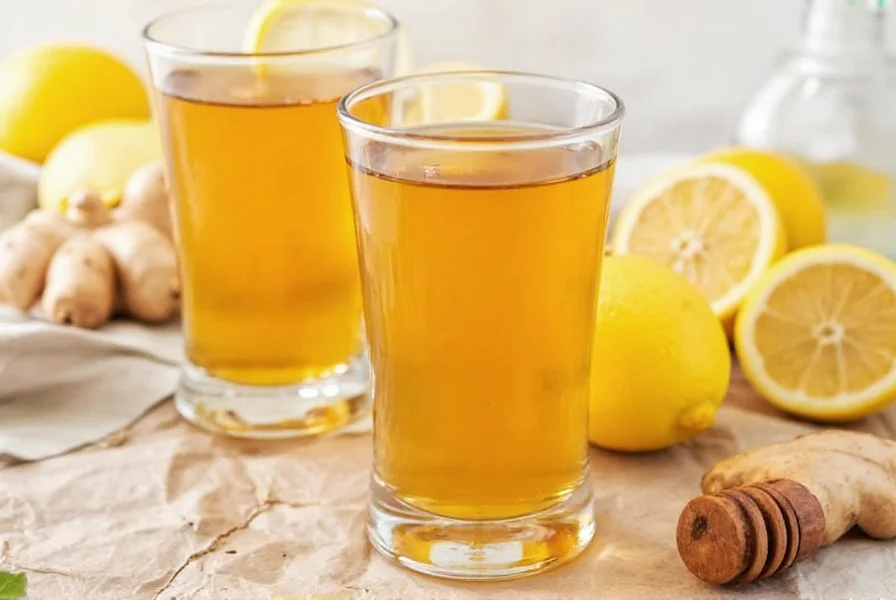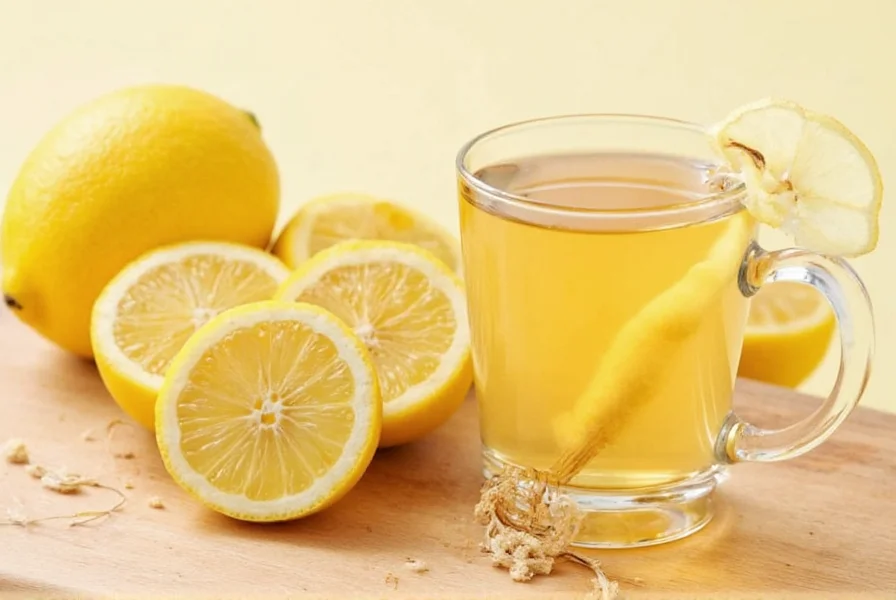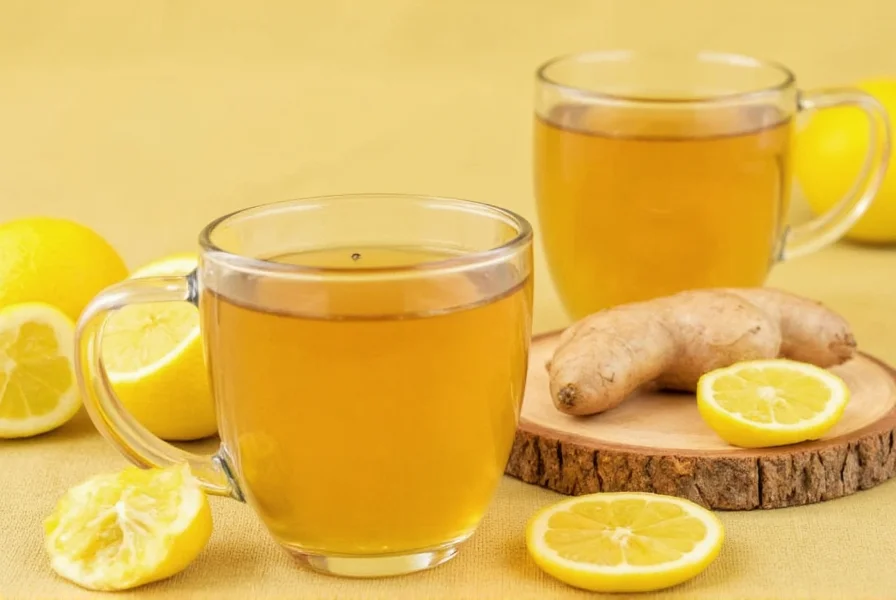For centuries, cultures worldwide have turned to honey ginger tea with lemon as a go-to remedy during cold season and for general wellness. This simple beverage isn't just comforting folklore—modern research reveals scientific backing for many of its traditional uses. Let's explore what makes this combination effective, how to prepare it properly, and when it can provide genuine relief.
The Science Behind Honey Ginger Tea with Lemon
Ginger contains potent compounds called gingerols that demonstrate significant anti-inflammatory and antioxidant properties. A 2013 study published in the Journal of Ethnopharmacology confirmed ginger's effectiveness in reducing nausea and supporting digestive health. Honey, particularly raw varieties, contains antimicrobial properties that can soothe irritated throat tissues. The World Health Organization recognizes honey as a recommended remedy for cough suppression in children over one year old. Lemon contributes vitamin C and flavonoids that support immune function and enhance the bioavailability of compounds in both ginger and honey.
How to Make Honey Ginger Tea with Lemon for Maximum Benefits
The preparation method significantly impacts the effectiveness of honey ginger tea with lemon. Follow these evidence-based steps:
- Use fresh ginger root (1-2 inches), thinly sliced or grated to maximize surface area
- Simmer ginger in 8-12 ounces of water for 10-15 minutes (longer simmering extracts more gingerols)
- Remove from heat before adding honey (temperatures above 140°F degrade honey's beneficial enzymes)
- Add 1-2 tablespoons of raw, unprocessed honey after cooling slightly
- Squeeze half a lemon just before drinking to preserve vitamin C

When Honey Ginger Tea with Lemon Works Best
Research indicates this combination is particularly effective for:
- Sore throats: Honey's viscous texture coats and soothes irritated tissues while ginger reduces inflammation
- Early cold symptoms: The combination may shorten duration when consumed at first signs of illness
- Digestive discomfort: Ginger stimulates gastric motility while honey may support gut microbiome balance
- Morning nausea: Particularly helpful for pregnancy-related nausea (consult your healthcare provider first)
| Benefit | Scientific Support Level | Best Time to Consume |
|---|---|---|
| Sore throat relief | Strong (multiple studies) | As needed, especially before bed |
| Cold symptom reduction | Moderate (anecdotal + some research) | At first signs of illness |
| Digestive support | Strong (clinical evidence) | 30 minutes before meals |
| Immune system support | Moderate (theoretical basis) | Daily preventive consumption |
Important Considerations and Limitations
While honey ginger tea with lemon offers multiple benefits, it's crucial to understand its limitations. This remedy works best as complementary support, not as a replacement for medical treatment. Honey should never be given to children under one year due to botulism risk. People with ginger allergies or those taking blood thinners should consult their healthcare provider before regular consumption. The sugar content in honey matters for those monitoring blood glucose levels—consider reducing honey quantity while maintaining effectiveness.
Does honey ginger tea with lemon help with weight loss? Current evidence doesn't support significant weight loss effects, though it can serve as a healthy alternative to sugary beverages. For immune support, consistent daily consumption appears more beneficial than occasional use during illness.
How This Remedy Compares to Alternatives
Compared to commercial cough syrups, honey ginger tea with lemon offers a natural alternative with fewer side effects, though it may provide less immediate symptom relief for severe cases. When contrasted with plain ginger tea, the addition of honey significantly enhances throat-soothing properties while lemon boosts antioxidant availability. Unlike many over-the-counter cold remedies, this preparation lacks artificial ingredients while delivering multiple active compounds that work synergistically.

Practical Tips for Daily Use
For preventive health maintenance, consume honey ginger tea with lemon once daily. During illness, increase to 2-3 times daily. To maximize benefits, use organic ingredients when possible and avoid boiling honey directly. For travel or convenience, consider preparing ginger syrup in advance (simmer ginger in equal parts water and honey for 20 minutes, then strain and refrigerate) and adding lemon juice to hot water as needed.
Frequently Asked Questions
How often should I drink honey ginger tea with lemon when sick?
When experiencing cold or flu symptoms, consuming honey ginger tea with lemon 2-3 times daily provides optimal benefits. The most effective timing includes first thing in the morning, after meals to support digestion, and before bed to soothe nighttime coughing. Consistent consumption maintains therapeutic levels of active compounds in your system.
Can honey ginger tea with lemon help with acid reflux?
Ginger's digestive benefits may help some people with mild acid reflux, but lemon's acidity could potentially worsen symptoms for others. If you have GERD or frequent heartburn, try preparing the tea without lemon initially. Many find that ginger alone, combined with honey, provides digestive support without triggering reflux. Consult your healthcare provider if you have chronic digestive issues.
What's the best time to drink honey ginger tea with lemon for immune support?
For optimal immune support, consume honey ginger tea with lemon in the morning on an empty stomach. This timing allows maximum absorption of beneficial compounds before food interferes. The vitamin C from lemon works synergistically with ginger's antioxidants when consumed first thing in the day. For preventive health, once-daily consumption provides sufficient immune system support without overwhelming your system.
Does honey ginger tea with lemon help with menstrual cramps?
Research suggests ginger may reduce menstrual pain severity comparable to some over-the-counter pain medications. A 2015 study in the Journal of Alternative and Complementary Medicine found ginger significantly reduced pain in women with primary dysmenorrhea. The warming effect of the tea combined with ginger's anti-inflammatory properties can provide relief. For best results, begin drinking the tea 2-3 days before expected menstruation and continue through the first few days.
How long does it take for honey ginger tea with lemon to work for a sore throat?
Most people experience noticeable sore throat relief within 20-30 minutes of consuming honey ginger tea with lemon. The honey immediately coats and soothes irritated throat tissues, while ginger's anti-inflammatory effects build over repeated doses. For best results, drink the tea while still warm (not hot) and allow the honey to coat your throat thoroughly. Consistent consumption every 2-3 hours provides cumulative benefits throughout the day.











 浙公网安备
33010002000092号
浙公网安备
33010002000092号 浙B2-20120091-4
浙B2-20120091-4